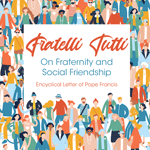 Explore Pope Francis' encyclical on Fraternity and Social Friendship (Fratelli Tutti) with John Day on Wednesday 5 May 10.30-12 midday via Zoom. This session will look at "A stranger on the road," the Pope's reflection on the parable of the Good Samaritan (Chapter 2), and "A better kind of politics" which introduces a new kind of politics in which the followers of Jesus are invited to engage (Chapter 5). Click here for more information and to register. You can read the full encyclical here. This session is part of the Carmelite Conversations series offered by The Carmelite Centre Melbourne.
Explore Pope Francis' encyclical on Fraternity and Social Friendship (Fratelli Tutti) with John Day on Wednesday 5 May 10.30-12 midday via Zoom. This session will look at "A stranger on the road," the Pope's reflection on the parable of the Good Samaritan (Chapter 2), and "A better kind of politics" which introduces a new kind of politics in which the followers of Jesus are invited to engage (Chapter 5). Click here for more information and to register. You can read the full encyclical here. This session is part of the Carmelite Conversations series offered by The Carmelite Centre Melbourne.
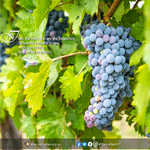 The purpose of remaining in communion with Jesus, the Vine, is for us branches to draw the life and nourishment we need to become good fruit. That fruit shows itself in lives of plenty, in rich and generous sharing of love, hope, comfort, compassion, joy and forgiveness.
The purpose of remaining in communion with Jesus, the Vine, is for us branches to draw the life and nourishment we need to become good fruit. That fruit shows itself in lives of plenty, in rich and generous sharing of love, hope, comfort, compassion, joy and forgiveness.
Celebrating At Home Fifth Sunday of Easter [PDF]
Celebrating At Home Fifth Sunday of Easter [ePub]
 The Gospel this Sunday shows us that the sheep (us) are at the centre of the life of Jesus and the Father! Jesus gives his all for them. He is a true shepherd prepared to lay down his life for his sheep. He is not like the hired man who runs away when danger appears. He knows his sheep and one day will gather them all into one flock. Read more
The Gospel this Sunday shows us that the sheep (us) are at the centre of the life of Jesus and the Father! Jesus gives his all for them. He is a true shepherd prepared to lay down his life for his sheep. He is not like the hired man who runs away when danger appears. He knows his sheep and one day will gather them all into one flock. Read more
Celebrating At Home Fourth Sunday of Easter [PDF]
Celebrating At Home Fourth Sunday of Easter [ePub]
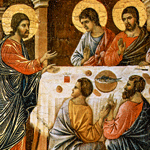 As we share the food of our Eucharistic meal each time we gather at mass, we recall that whenever Jesus shared a meal with his followers he opened their hearts and minds. Jesus said: “Touch me and see for yourselves.” We may not be there in Jerusalem in that room with the disciples reaching out to touch Jesus, but we can touch and see Jesus in all the good things around us in our world... Read More
As we share the food of our Eucharistic meal each time we gather at mass, we recall that whenever Jesus shared a meal with his followers he opened their hearts and minds. Jesus said: “Touch me and see for yourselves.” We may not be there in Jerusalem in that room with the disciples reaching out to touch Jesus, but we can touch and see Jesus in all the good things around us in our world... Read More
Celebrating At Home Third Sunday of Easter [PDF]
Celebrating At Home Third Sunday of Easter [ePub]
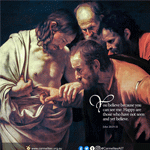 In today’s Gospel reading there are two stories of transformation through encounter with the risen Jesus. Firstly, Jesus appears to a group of frightened and bewildered disciples hiding in a room. His first words are, ‘Peace be with you’. Fear and bewilderment turn into joy as the disciples recognise the presence of the Risen Jesus with them. But that’s not all… Read more
In today’s Gospel reading there are two stories of transformation through encounter with the risen Jesus. Firstly, Jesus appears to a group of frightened and bewildered disciples hiding in a room. His first words are, ‘Peace be with you’. Fear and bewilderment turn into joy as the disciples recognise the presence of the Risen Jesus with them. But that’s not all… Read more
Celebrating At Home Second Sunday of Easter [PDF]
Celebrating At Home Second Sunday of Easter [ePub]
 With homes washed away, roads and infrastructure damaged, and thousands now homeless, the people of Timor-Leste need your help. The Carmelites are providing food, water and clothing to those affected and our students are helping to clean and rebuild houses. Many people have lost everything. Please donate at: https://timor-floods-emergency-appeal.raisely.com/ Read more
With homes washed away, roads and infrastructure damaged, and thousands now homeless, the people of Timor-Leste need your help. The Carmelites are providing food, water and clothing to those affected and our students are helping to clean and rebuild houses. Many people have lost everything. Please donate at: https://timor-floods-emergency-appeal.raisely.com/ Read more
 When someone dies, one of the things we often feel is their absence. The rooms where they lived with us, the places where they sat are now empty and our hearts ache. In a way, we are all caught in tombs which hold loved ones, our experiences of hurt and harm, our fears and anxieties. What we seem to need above all is presence. Easter is a story of transformation. Where once there was only absence, now there is calm, loving, healing Presence and we know we are not alone. Our tombs begin to empty and joy becomes possible again. Resurrection is all about death giving way to life, the impossible becoming possible, absence becoming presence.
When someone dies, one of the things we often feel is their absence. The rooms where they lived with us, the places where they sat are now empty and our hearts ache. In a way, we are all caught in tombs which hold loved ones, our experiences of hurt and harm, our fears and anxieties. What we seem to need above all is presence. Easter is a story of transformation. Where once there was only absence, now there is calm, loving, healing Presence and we know we are not alone. Our tombs begin to empty and joy becomes possible again. Resurrection is all about death giving way to life, the impossible becoming possible, absence becoming presence.
Celebrating At Home for Easter Sunday [PDF]
Celebrating At Home for Easter Sunday [ePub]
 Our afternoon liturgy is a meditation on the passion and death of the Lord. We begin listening to the words of Isaiah about the suffering servant on whom is laid the sin of all. We are struck by the brutality of the passion. We wonder at the depth of love of a God who gives up his own life that we might truly live. We venerate the cross, not as a symbol of horrible death, but as a sign of the victory of God’s love; the end of one way of living and beginning of another. We pray with Christ’s spirit for the needs of the world. We receive again the Food that nourishes and strengthens us on our journey to Easter day.
Our afternoon liturgy is a meditation on the passion and death of the Lord. We begin listening to the words of Isaiah about the suffering servant on whom is laid the sin of all. We are struck by the brutality of the passion. We wonder at the depth of love of a God who gives up his own life that we might truly live. We venerate the cross, not as a symbol of horrible death, but as a sign of the victory of God’s love; the end of one way of living and beginning of another. We pray with Christ’s spirit for the needs of the world. We receive again the Food that nourishes and strengthens us on our journey to Easter day.
Celebrating At Home for Good Friday [PDF]
Celebrating At Home for Good Friday [ePub]
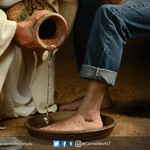 On this night we recall Jesus’ commandment to love one another, his washing of the disciples’ feet and the breaking of the bread of his own life, not just at table, but also on the altar of the Cross, for the healing and nourishment of the world. The liturgy on Holy Thursday is a meditation on the essential connection between the Eucharist and Christian love expressed in serving one another. Christ is not only present in the Eucharist but also in the deeds of loving kindness offered to others through us. We are the ones who make ‘real’ the presence of Jesus in every smile, kind word and loving action. Download our Celebrating At Home liturgy for Holy Thursday.
On this night we recall Jesus’ commandment to love one another, his washing of the disciples’ feet and the breaking of the bread of his own life, not just at table, but also on the altar of the Cross, for the healing and nourishment of the world. The liturgy on Holy Thursday is a meditation on the essential connection between the Eucharist and Christian love expressed in serving one another. Christ is not only present in the Eucharist but also in the deeds of loving kindness offered to others through us. We are the ones who make ‘real’ the presence of Jesus in every smile, kind word and loving action. Download our Celebrating At Home liturgy for Holy Thursday.
Celebrating At Home for Holy Thursday [PDF]
Celebrating At Home for Holy Thursday [ePub]
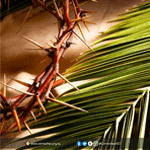 In the person of Jesus, God emptied himself into a fragile, naked, tortured human being at the mercy of civil and religious authorities. The God that the religious authorities and the people of Jesus’ time expected in the Messiah is not the God who showed up in the carpenter’s son. Often, too, the God we expect and want is not the God who shows up in the person of Jesus. What we see in the passion of Jesus is just how passionate God is about us humans. Read more
In the person of Jesus, God emptied himself into a fragile, naked, tortured human being at the mercy of civil and religious authorities. The God that the religious authorities and the people of Jesus’ time expected in the Messiah is not the God who showed up in the carpenter’s son. Often, too, the God we expect and want is not the God who shows up in the person of Jesus. What we see in the passion of Jesus is just how passionate God is about us humans. Read more
Celebrating At Home Palm/Passion Sunday [PDF]
Celebrating At Home Palm/Passion Sunday [ePub]














